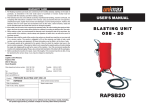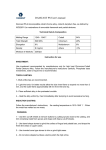Download TradesPro 837254 Use and Care Manual
Transcript
MAINTENANCE Disconnect air compressor from power source and bleed off all air pressure before attempting any maintenance or repair. SHUTDOWN AND STORAGE: NEVER stop the air compressor by unplugging it from the power outlet as this may result in damage to the compressor. 1. Turn the switch to the OFF position 2. Disconnect the power cord from the power outlet. Disconnect the power cord from the power outlet by grabbing the plug (not the cord). Loop around electric cord holder for storage. 3. Turn the pressure regulator knob fully counterclockwise to close airflow from air outlet port. Check the outlet pressure gauge to ensure that it reads 0 PSI. 4. Remove the air hose and any air accessories. 5. Drain moisture from the air tank by slowly opening the air tank drain valve by turning counter clockwise. Tilt tank to remove all moisture. Once all the moisture has drained out, close the fitting securely. 6. Allow the compressor to cool down. 7. Wipe the air compressor clean and store it in a clean, dry, and non-freezing location. WHEN PERFORMING ANY MAINTENANCE OR SERVICE: 1. The air compressor must be turned off. 2. Disconnect compressor from the power source. 3. Open tank drain to bleed off all air pressure before attempting any maintenance or repair. 4. Allow compressor to fully cool before attempting any maintenance or repair. Check the air compressor frequently for any visible problems and follow maintenance procedures each time the compressor is used. MAINTENANCE CHECKLIST: Daily: • Drain accumulated liquid from tank. • Check for unusual noise and/or vibrations. • Check that all fasteners are secure. • Wipe compressor clean. 14 Monthly: • Check for air leaks. MOISTURE IN COMPRESSED AIR Moisture is a normal by-product of compressing air. As the moisture builds during compressor use, it can be carried though the air hose. When using paint spray gun or sandblasting gun, the use of a special filter to remove moisture from the air line is highly recommended. Moisture in the compressed air will cause water spots in paint jobs and cause blasting media to clog the sandblasting gun. TROUBLESHOOTING GUIDE THE COMPRESSOR DOES NOT START OR RESTART: PROBABLE CAUSE: SOLUTION: Power cord not plugged in. Plug cord into grounded outlet. Motor/Pressure switch in Move switch to AUTO position. OFF position Wrong gauge wire or length Check chart in instruction manual for proper of extension cord. gauge wire and cord length. Air tank pressure exceeds Motor will start automatically when air tank motor/pressure switch pressure drops below "cut-in" pressure of "cut-in" pressure. motor/pressure switch. WHEN IN THE START/STOP OPTION, MOTOR RUNS CONTINUOUSLY: PROBABLE CAUSE: Air compressor is incorrectly sized. SOLUTION: Limit the air pressure to the capacity of the air compressor. Either use a smaller tool or a larger air compressor. AIR LEAKS AT FITTINGS: PROBABLE CAUSE: Fittings are not tight enough. SOLUTION: Tighten fittings where air can be heard escaping. Check fittings with soapy water solution. DO NOT OVERTIGHTEN. INSUFFICIENT PRESSURE AT AIR TOOL OR AIR ACCESSORY: PROBABLE CAUSE: SOLUTION: 15 Pressure regulator knob is not turned to high enough pressure. Defective motor ON/OFF switch. Air leaks. Hose or hose connections are too small or long. Air compressor is not large enough for air requirement. Adjust pressure regulator knob to proper setting. Replace. Check for leaks by applying soap solution to all fittings and connections. Bubbles will appear at leakage points. Tighten or replace leaking fittings or connections as needed. Replace with larger hose or connectors. Check the accessory air requirement. If it is higher than the CFM or pressure supply of the air compressor, you need a larger air compressor. MOISTURE IN DISCHARGE AIR: PROBABLE CAUSE: Condensation in air tank caused by high level of atmospheric humidity or air compressor is not running long enough. SOLUTION: Drain tank after every use. Drain air tank more often in humid weather and use an air line filter. 16







